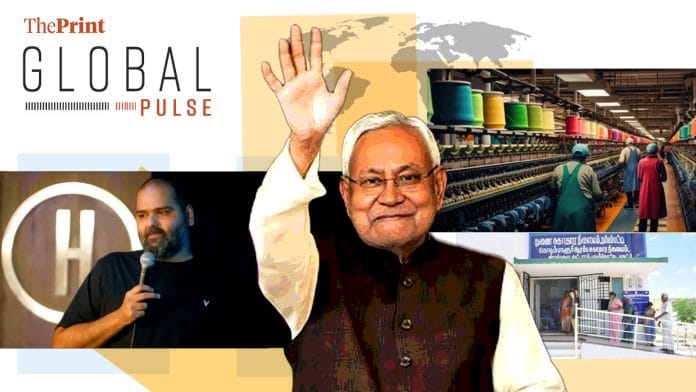New Delhi: The recently concluded Bihar assembly elections have drawn global notice not just for the landslide victory delivered to the ruling NDA, but for the unexpected comeback of 74-year-old Nitish Kumar. Almost written off on perceived health issues and battling anti-incumbency, he still managed to claim another term as chief minister.
In the Financial Times, the Bihar stalwart has been branded as the “Joe Biden of India”. During the campaign for the assembly polls in Bihar, he was backed by aides who were not long before “alarmed by his gaffes, blank stares and memory lapses.” But there’s a difference. Nitish Kumar won.
“If Bihar were a country it would be the world’s 12th poorest, behind Liberia,” writes Ruchir Sharma. “That Kumar won anyway says much about the clash of hope and resignation in India. The gap between average incomes in the poorest and richest states—Bihar and Telangana—is six to one. The comparable gap is roughly four to one or less in Brazil, China, the US and other major nations.”
Kumar’s victory also signals a global trend, writes Sharma.
“As developed democracies turn hostile to incumbents, their developing peers are turning the other way. In India, seated leaders were losing 70 per cent of state elections before the 2000s. They’ve come back since, winning more than half of these contests this decade,” he says. “Respect for elders, an almost spiritual acceptance of slow progress and increasing incumbent control over the machinery of state all help explain how a Joe Biden figure could win in India.”
Also Read: Nitish Kumar, the man for all seasons: Why Bihar can’t retire him and the BJP can’t replace him
Gujarat vs Tamil Nadu debate
Ahead of Prime Minister Narendra Modi’s lofty pledge of turning India into a developed economy by 2047, the Economist pits two Indian states—Gujarat and Tamil Nadu—against each other, sizing up the “two exemplars”.
The “socially conservative” Gujarat fares well on certain indicators. It has prospered for decades, says The Economist.
“For generations, Gujarat has prospered as a manufacturer of textiles, polisher of diamonds and hub for shipping. More recently it has sold itself as a home for capital-intensive megaprojects, such as in pharmaceuticals and petrochemicals. It is now attempting to grow in financial services and to break into chipmaking,” the article says.
Meanwhile, Tamil Nadu lags behind in “telling ways”. But even so, it’s created a workforce that cannot be rivalled.
“Its primary-health centres have about 60 percent more doctors than Gujarat’s; its public hospitals have more than twice as many beds (and the most, in absolute terms, of any state). Over 80 percent of its youngsters stay in school for the maximum period. Around half of young adults go on to college or university (the national average is 28 percent),” says The Economist.
There are lessons to be learnt from these contrasting ideas of growth, it says. Indian politicians find it “easier and more appealing to seek growth by laying concrete than by pumping up skills”.
“The fruits from improving schooling, by contrast, come much slower. Yet unleashing the power of India’s young and massive population will require investment in health and education. It will also mean fighting obstacles, such as sexism, caste and environmental degradation that keep people from fulfilling their potential. This is far from easy work. But, as Tamil Nadu shows, it would pay off in spades,” says The Economist report, spotlighting the state’s radically different approach.
The weekly also writes on how Indian comedians have never been so successful or endangered.
The ‘crackdown’ on comedy
In its current form, The Habitat, the Mumbai-based comedy club which was ransacked following comedian Kunal Kumra’s show, is evidence of the Indian State’s “crackdown” on comedy, it writes.
“The most recent attack, in March, came after Kunal Kamra used the word ‘gaddar’ (traitor) in apparent reference to the deputy chief minister of Maharashtra. This is the scowl-smile paradox of comedy in India: it has never been more dangerous—or more popular,” says The Economist. “Performers face a very real prospect of violence. Vir Das has said he received 50,000 death threats after a set about the ‘two Indias’ in 2021.”
Kamra calls the prevailing environment “claustrophobic.”
“Freedom of expression for artists, journalists and other critics has deteriorated under Narendra Modi’s government. Freedom House, a think-tank, classifies India as ‘partly free’ alongside countries such as El Salvador and Mozambique. India’s constitution claims to guarantee freedom of speech, but it makes exceptions for the sake of ‘public order, decency or morality’,” notes The Economist.
In the New York Times, Anupreeta Das reports on India’s population of working women––who are bearing the brunt of the country’s searing heat.
“Prolonged exposure to hot weather, especially when combined with humidity, can hinder the ability of people to lead healthy, safe and productive lives. The physiological stress can lead to chronic illnesses and increase people’s chances of dying,” says the report.
“More than 90 percent of working women in India are in the informal sector. Some can lose as much as 60 percent of their income during the brutal summer months because their working hours are reduced by almost half, or they have to abandon their work,” Reema Nanavaty, who heads the Self-Employed Women’s Association, has been quoted as telling the New York Times.
(Edited by Ajeet Tiwari)
Also Read: Shah Rukh Khan said to Vir Das: ‘Show me what you’ve got’






